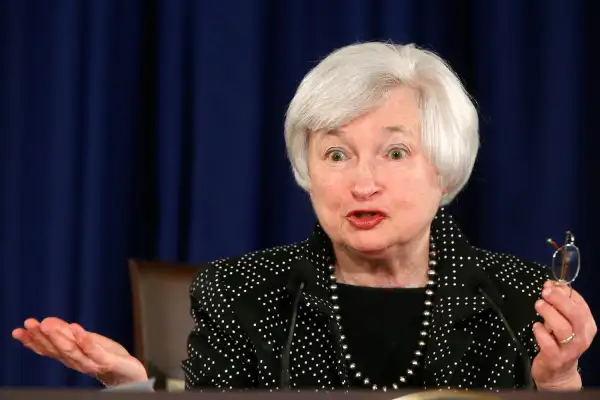New Inflation Data Puts Janet Yellen's Fed—and Investors—in a Bind
Money is not a client of any investment adviser featured on this page. The information provided on this page is for educational purposes only and is not intended as investment advice. Money does not offer advisory services.

There's a reason people tell white lies. Being completely open and honest all the time quickly lands you in awkward situations. And that's where Federal Reserve chair Janet Yellen finds herself today.
This morning, a key gauge known as the price index for personal consumption expenditures (or PCE) showed that inflation is now rising at an annual rate of 1.8%. That represents a noticeable jump from earlier this year.
US PCE Inflation Rate data by YCharts
Not only that, the PCE price index confirms what the more widely followed consumer price index has already been telling us: That inflation, though mild by historical standards, is now rising at around a 2% clip.
US PCE Inflation Rate data by YCharts
Why is this important? Because in an effort to be "transparent" a couple years ago, the Federal Reserve, then led by Ben Bernanke and vice chair Yellen, began telegraphing to the investment world what rate of inflation it is shooting for.
In fact, Fed officials literally stated that they are shooting for the PCE price index to rise at an annual rate of 2%. Here's what they said in their 2012 press release:
The inflation rate over the longer run is primarily determined by monetary policy, and hence the Committee has the ability to specify a longer-run goal for inflation. The Committee judges that inflation at the rate of 2 percent, as measured by the annual change in the price index for personal consumption expenditures, is most consistent over the longer run with the Federal Reserve's statutory mandate. Communicating this inflation goal clearly to the public helps keep longer-term inflation expectations firmly anchored, thereby fostering price stability and moderate long-term interest rates and enhancing the Committee's ability to promote maximum employment in the face of significant economic disturbances.
In essence, the Fed wants investors to know exactly what to expect in terms of the central bank's policies in setting short-term interest rates. That way, the market won't misinterpret the Fed and overreact when it comes to establishing long-term interest rates.
But for this relationship to work, Yellen will have to follow through on the Fed's promise. The markets will demand that the Fed address the potential threat of inflation once it crosses 2%, and the data released on Thursday clearly show that we are nearing that point.
Folks are already beginning to call for the Fed to do just that. As Howard Gold at Marketwatch noted, "amid clear signs the economy is recovering, Yellen and the Fed face a different challenge," he wrote. "While continuing to fret over the 'weakness' of the labor market and even encouraging some short-term inflation, they will have to keep underlying inflation from getting out of hand."
Yet if the Fed addresses inflation too abruptly — or in the opinion of investors too aggressively — by ending stimulus and actually lifting short-term rates, the market's bulls may use that as a sign to take the summer off.
Times like this are when Yellen probably wishes she had the flexibility to act in private as many of her predecessors had.
It's often forgotten that when Alan Greenspan began his chairmanship in the late 1980s, the Fed did not even tell Wall Street that it had changed interest rate policy. The only way the public found out was to see how bank lending rates reacted after the fact.
Today, the Fed not only issues press releases, Yellen herself gives lengthy press conferences, as Bernanke did.
But here's a novel idea: Why doesn't the Fed simply pipe down about what it thinks it's likely to do going forward, and just do what it thinks is right? Quietly.
If investors learn after the fact that rates had been rising all along — alongside equity prices — perhaps investors will realize that they don't need such a stimulative Fed to keep stocks going higher.